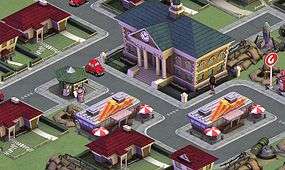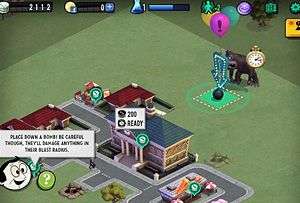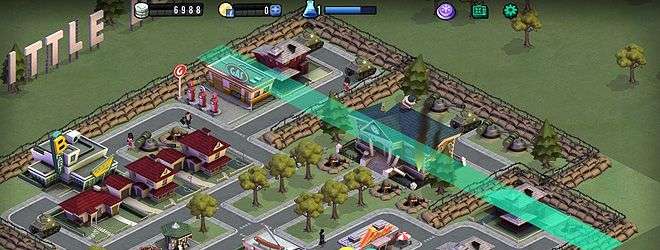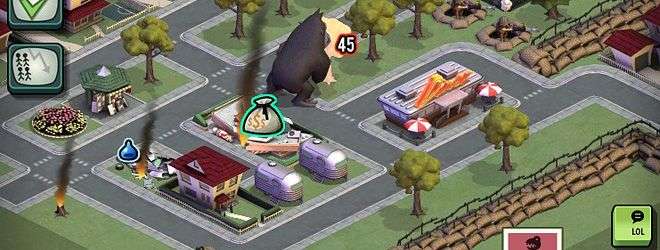Monstermind – Preview
by Edward
 It had been a long uphill struggle for the little town of Squished-Under-Foot but, finally, the citizens had a safe bastion where they were able to appreciate the fact that all their blood was inside their bodies, and that they were existing in a state of living, contrary to the town’s rather fate-tempting name. Sadly, that was all set to change (and all too soon). Without warning, a giant monster appeared and descended upon the town hall where residents had just held their first weekly party celebrating not being trampled by monsters. To be fair, they were asking for it.
It had been a long uphill struggle for the little town of Squished-Under-Foot but, finally, the citizens had a safe bastion where they were able to appreciate the fact that all their blood was inside their bodies, and that they were existing in a state of living, contrary to the town’s rather fate-tempting name. Sadly, that was all set to change (and all too soon). Without warning, a giant monster appeared and descended upon the town hall where residents had just held their first weekly party celebrating not being trampled by monsters. To be fair, they were asking for it.
The destruction was swift and brutal, and as the survivors pulled themselves from the wreckage and began to rebuild, the mayor of the neighbouring town guffawed heartily at another successful attack. Readying himself for another victory party, his expression turned to fear as he discovered that the nearby towns had allied together in revenge, and that his carefully built town of Trampled-Upon-Ground was about to become the next place to be razed to the ground.
This is Monstermind, the next level of social gaming. On the eve of the Eurogamer Expo, Bossa Games launched a beta of the product, and were displaying it on the show floor. When I went to take a look at the game, I was kindly joined by Mike Bithell, the game’s Design Lead, who was on hand to give me a guide to the world of Monstermind and answer any questions I had.
Taking the isometric style popularised by the likes of Cityville and Sim City, Monstermind is a real-time multiplayer game for Facebook, which promises to change the way that gaming is approached on the social network. As the player, you’re charged with taking control of a town in a pseudo-1950′s world, building up your defences and protecting yourself from various monster attacks, whilst trying to destroy neighbouring towns yourself. Constructing houses gives your town more power, which then allows you to build more weapons and defences. Each monster has a different radius of attacks, and it’s how you employ them that matters. Do you use them just to wipe out the gun defences, or do you take down the houses and watch as the town goes without power? How about a giant assault against the town hall, knowing that taking it out means everything else falls as well? As soon as you step into the world of Monstermind, you’ll discover three things that help it to stand out from the other social games out there.
The first of these is the fact that you can gain everything in the game without having to shell out money for the privilege. Monstermind isn’t a game that shuts off your options in order to justify making a profit, and it’s possible to save up your money and resources the good old fashioned way without feeling like you’re being punished or left out for not opening your wallet. Just as importantly, unlike some of the mainstream Facebook games, Monstermind doesn’t force you to spam the crap out of your wall in order to earn necessary items. I recently took my first steps into social gaming with EA’s Sims Social and recently deleted it because I found it impossible to progress any further without spamming my feed asking for quest-necessary items, and to progress without doing that I’d have to reach for my credit card to purchase the tokens necessary to buy them myself. So it cheered me up no end when Mike told me that while Bossa Games saw they could use the spam options for their game, they decided they’d prefer the players, rather than the developers, be the one to message your friends. Enter the ‘lol’ button. Sitting by the menu at the bottom of the screen, you’re able to click it at any point to send a message to your friend’s wall and laugh at their unfortunate destruction at your hands. You could play the game as much as you want and never use it, and you’d miss nothing except the chance to laugh at your mates. Brilliant.
 The third difference is possibly the best: you’re not constricted by a limited amount of energy which slowly replenishes over time, meaning you can pick up and play the game whenever you want. Going back to the Sims Social as my only other social game experience, one of the most irritating factors was being confined to only a few actions (which would take a couple of minutes to perform), then being forced to wait two hours before I could do anything else. It felt like a cynical implementation designed to make people feel like they had to keep coming back just to progress, rather than because they actually enjoyed what they were doing.
The third difference is possibly the best: you’re not constricted by a limited amount of energy which slowly replenishes over time, meaning you can pick up and play the game whenever you want. Going back to the Sims Social as my only other social game experience, one of the most irritating factors was being confined to only a few actions (which would take a couple of minutes to perform), then being forced to wait two hours before I could do anything else. It felt like a cynical implementation designed to make people feel like they had to keep coming back just to progress, rather than because they actually enjoyed what they were doing.
Being able to pick up and play Monstermind whenever you want without worrying about how many moves you perform is also a big plus when an attack from your friends can come at any moment. However, if you want to make your assaults even more devastating, it is possible to build structures that can then unleash massive attacks after several hours of charging in real time, leaving nothing in their wake. Doing so then means that your enemies have another resource of yours to take down because, after all, they may have been the next target.
After being talked through the game, I asked Mike Bithell about the choice of the 1950′s for Monstermind’s setting. When the game was first conceived, the idea of using the monsters came first, with the fifties vibe coming later on in the development. He went on to explain to me that there was little worry about it winning people over, as both Team Fortress 2 and the Fallout series both heavily employ a similar style, and are well loved by the more hardcore gamers, with casual gamers able to enjoy the look without consciously thinking of those titles. It works well for Monstermind too, with the B-Movie inspirations running deep through what I saw, as even the mission objectives that appeared on the left of the screen would be accompanied by a short black and white cartoon which wordlessly set up the next player task. At twenty-one years old, the composer of the game has done an amazing job of producing that same atmosphere through the soundtrack, which compliments the action immensely and widens the smile you’ll find growing on your face after smashing up your friend’s weapon defences. For those unfamiliar with the genre, the game also promises a short five to ten minute tutorial, which also does its best to break the fourth wall and poke fun at Facebook games, and will even joke if you try and ignore its advice.
As he was guiding me through the game, Mike mentioned that Westwood’s Red Alert 2 was his favourite game of all time, and I took that opportunity to ask what other titles helped inspire him when creating Monstermind. The answer was a simple one: everything. As a Lead Designer, there was something to learn from every game from a design perspective, and it’s knowing what features will be most popular and how to implement or build on them that matters. After Halo was released, Mike explained that he knew that most games afterwards would then use A to jump, as so many people had played the game that they’d be used to pressing that button to jump when playing something else, and it’s the popular games that dictate the controls and mechanics of future releases. As I previously mentioned, Monstermind uses an isometric view much like Cityville and Sim City, as the success of Zynga Games guaranteed that most casual players would be familiar with the format. Those social games were also a big inspiration as well, as Mike felt many of them weren’t “gamey enough”, and examining why was a big help when creating Monstermind.
While Monstermind is only in a beta stage at the moment, with the wider release coming some time soon, Monstermind looked like something to be seriously reckoned with, and by approaching the social game in a way that never feels like it’s forcing you to play, it will be one that gamers will hopefully come back to time and again of their own free will. That and to spam the ‘lol’ button over and over while you reduce a friend’s town to ruins.
Last five articles by Edward
- Best of 2015: Journey's End: A New Beginning
- Journey's End: A New Beginning
- You Can't Choose Your Happy Ending
- Okay, Let's Fix Comedy In Games - The V-Effekt
- Time Keeps On Smashing Away





















I love the look of this game, and te visuals were the first thing that pulled me in, even before I read further. While I have never experimented heavily with the drug that is Facebook games, this is one of the very few that actually has me interested, mainly thanks to the fact that you don’t have to spam the fuck out of your friends’ walls. I hate that shit about FB games. The few that actually grabbed my interest were swiftly deleted when I realised that basically I had to ‘chain letter’ my friends in order to make any progress. Fuck that. This has charm and the gameplay actually sounds absorbing, so I’m looking forward to it